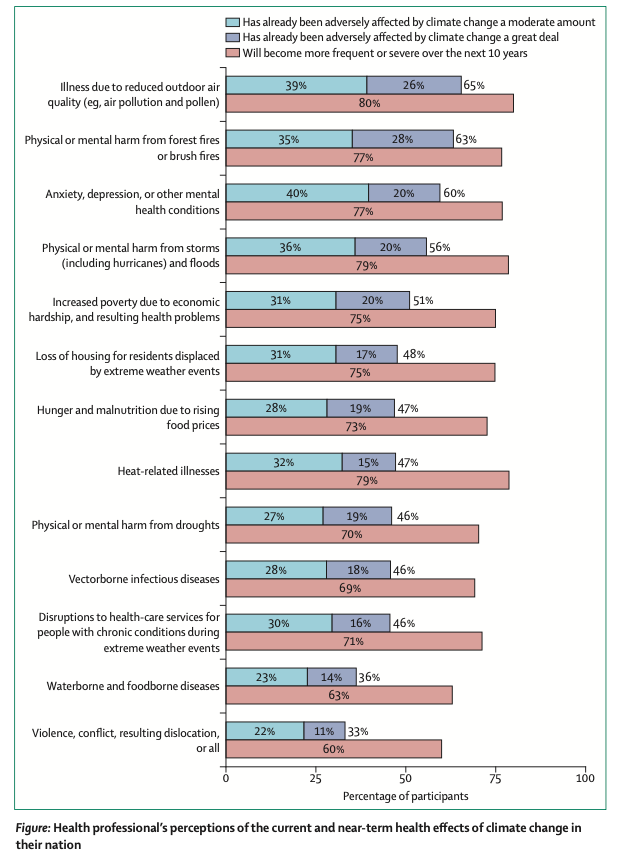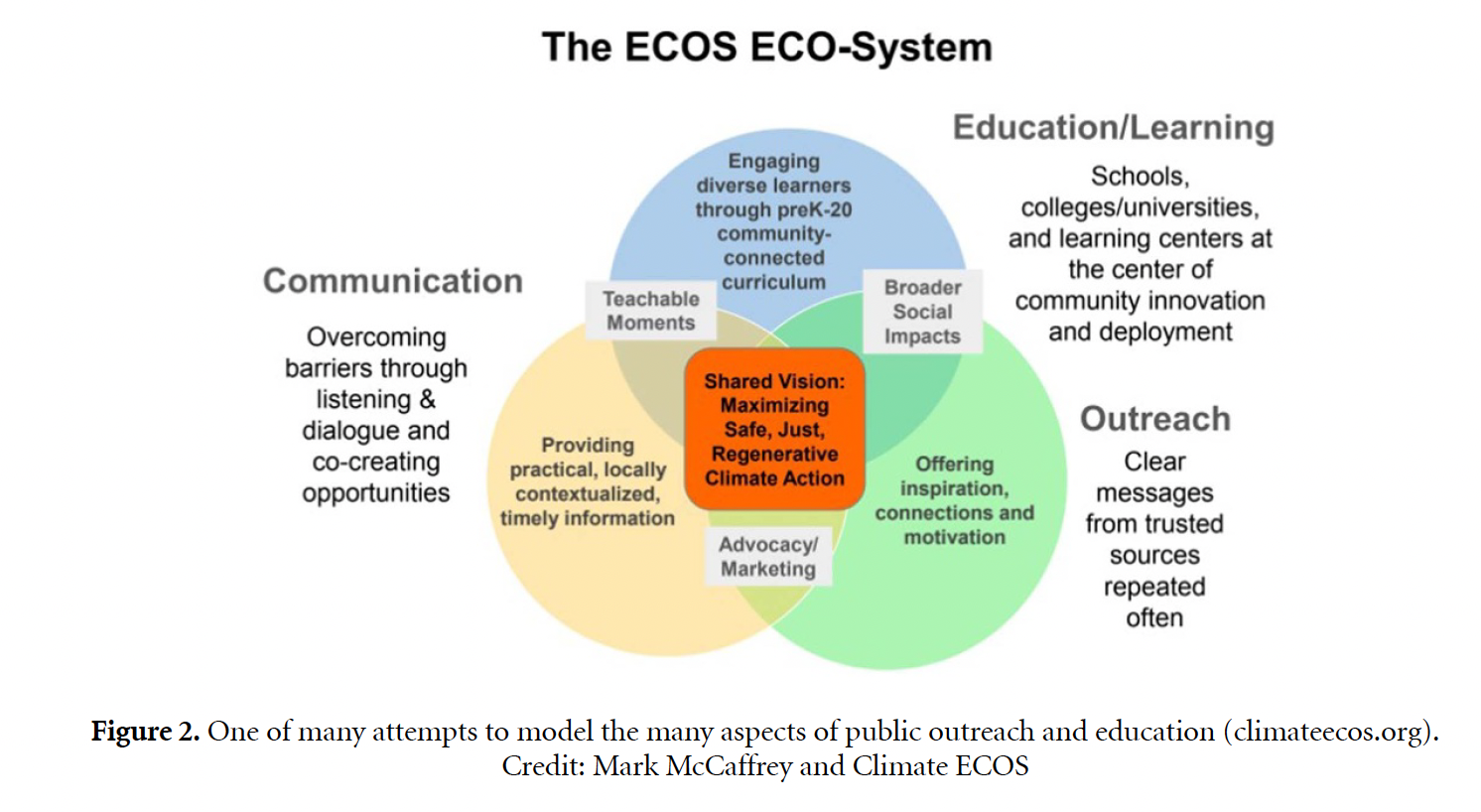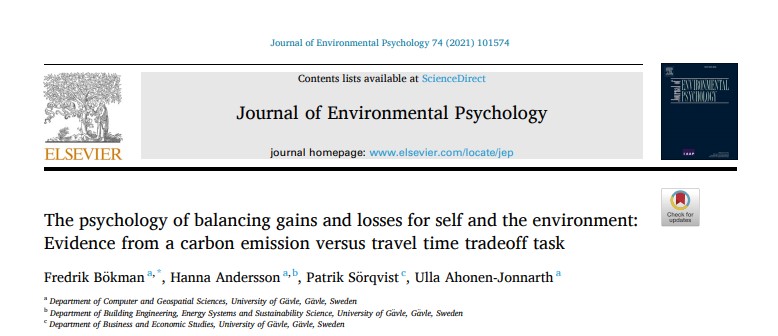Resources
Search below for resources covering the intersection of climate engagement, social science and data analytics.
RESULTS
Views of health professionals on climate change and health: a multinational survey study
Medical professionals largely understand that climate change is happening and is caused by humans, view climate change as an important and growing cause of health harm in their country, and feel a responsibility to educate the public and policymakers about the problem. Despite their high levels of commitment to engaging in education and advocacy on the issue, many survey participants indicated that a range of personal, professional, and societal barriers impede them from doing so, with time constraints being the most widely reported barrier. However, participants say various resources—continuing professional education, communication training, patient education materials, policy statements, action alerts, and guidance on how to make health-care workplaces sustainable—can help to address those barriers.
A question of morals? The role of moral identity in support of the youth climate movement Fridays4Future
When drumming up support for a movement, remind people of their moral identity - that is, the extent to which they feel that moral traits (such as being fair, caring, and kind) are important to who they are as a person. This survey study finds that the strength of an individual's moral identity is significantly associated with their support for an emerging youth climate movement, Fridays4Future. However, given that this study uses a convenience sample of German adults and focuses on a highly polarizing social movement in Europe, caution should be taken when generalizing this result to the U.S.
Building capacity, momentum and a culture of climate action in the United States
Action for Climate Empowerment (ACE) is the section of the Paris Agreement that urges countries to "increase public understanding, build capacity, and empower people to participate in creative decision-making and behavioral change." This article reflects on the state of climate action in the US and offers suggestions for the how we might equitably co-create and implement a national climate action strategy. The authors call for an interdisciplinary approach that recognizes the importance of climate science, decision science, and social science, as well as effective communication through writing and design work. They also argue that a national climate action strategy would help to guide financial investments in climate education, communication, and organizing and create mechanisms for identifying and sharing the attributes of successful community-based and regional climate initiatives.
Muslims and climate change: How Islam, Muslim organizations, and religious leaders influence climate change perceptions and mitigation activities
What role does religion play in climate change rhetoric? A growing body of literature has begun to link religiosity to climate change attitudes, but most of this research has focused on Christianity in the Global North. Muslims represent the second largest faith group worldwide, and a significant proportion of the Muslim population lives in countries or areas that are particularly vulnerable to climate change. Given the diverse experiences and backgrounds of Muslims across the world, it is not surprising to find that there is no universal perspective on climate change among Muslims. It is also the case, however, that the social networks that exist among religious organizations provide great opportunities to continue disseminate information and mobilize advocacy efforts around climate change.
Affect and emotions as drivers of climate change perception and action: a review
Emotions are a powerful tool for changing people’s climate-related behaviors, but should be used carefully. This resource reviews research on emotions and climate change from the past five years, finding that people who are worried about climate change or have negative affect—an unpleasant gut feeling—toward it are more willing to engage both in mitigation behaviors like using public transport or saving electricity, as well as adaptation behaviors like purchasing insurance or seeking information about hazards. However, use caution when using messaging to invoke negative emotions about climate change. Creating intense climate anxiety may reduce people’s general well-being, and research in health communication has found that fear, without hope, may be counterproductive to behavior change. Instead, combine messages about the threat of climate change with “constructive hope” messaging, which focuses on feasible solutions and how individual and collection action can make a difference.
The psychology of balancing gains and losses for self and the environment: Evidence from a carbon emission versus travel time tradeoff task
Motivational messaging can encourage people’s willingness to make trade-offs in favor of the environment. In this study, researchers find that giving people information about how longer air travel times reduce carbon emissions make people more willing to have longer travel times. This willingness was even higher for those who were told the travel time would be much longer, rather than just a little longer. Finally, the authors also find that the effects of messaging are strongest among those with higher levels of environmental concern. Members interested in encouraging trade-offs in favor of the environment should consider motivational information framing.
Community Climate Conversations: Engaging and Empowering Local Action in a Changing World
Community-based climate communications can increase awareness, facilitate interpersonal connections, and lead to climate actions. This resource studied how the Twin Ports Climate Conversations (TPCC) project in the upper Midwest has influenced local climate awareness and response. TPCC brought professional environmentalists and concerned citizens together in 2016 for a monthly climate change presentation and discussion event. TPCC highlighted a variety of climate change–oriented topics with a critical emphasis on how climate change is affecting or will affect the Western Lake Superior region and the implications of these impacts. A survey of participants in TPCC conversations found that 72% of them made professional contacts from participation and 45% had taken some kind of climate action as a result of participating in TPCC. Some prominent examples of actions included "presented on climate and extreme storms to Duluth Chapter of American Society of Civil Engineers," "incorporated the information into my classroom curricula," and "planting different trees."
An Approach to Understanding and Measuring People Power
Existing methods of measuring people power and impact could be improved to make organizing stronger. This report—written for both scholars and organizers—first argues that we should conceive of the locus of power as what the people, not political elites, have the potential to do. It breaks down power into multiple sub-components, which can be all measured: inputs (e.g., 1:1 meetings, events, voter contact) and outputs (e.g., growing constituency base, policy changes, election outcomes). It provides some tips for measuring power, such as mapping out networks of organizations, analyzing text of various messaging across time or place, and collecting data on legislative bills proposed or passed by a specific government. There are other ways to measure potential power and engagement, by collecting data on direct action attendees or organizational membership over time—and their changing roles in any organization hierarchies. To try to understand impact, these measures of power “inputs” can be correlated with the “outputs”. Organizations will often have to collect this data, themselves—unless they partner with researchers like the P3 Lab or the Democracy and Power Innovation Fund.
What Happened in 2020
Joe Biden and Kamala Harris won in 2020 with a multiracial coalition, and 2020 was the most diverse electorate ever. Latino voters continued to favor Democrats, but Republicans made inroads with Latino voters. Black voter turnout increased substantially, resulting in significant gains for democrats, despite a modest overall drop in Democratic support levels. The urban-rural voting divide continues to be immensely important, with suburbs growing more Democratic and racially diverse. Young voters drove record-breaking turnout. This long report includes many data analyses and visuals to describe voting patterns in the 2020 election.
Climate activism and its effects
Synthesis of research on the specific ways citizens have engaged civically around the issue of climate change and documented effects of these efforts on climate change itself suggests:
- Behavior-change campaigns can positively influence lifestyle choices that reduce their individual carbon footprints, such as reducing car-use, purchase renewable electricity, and eating less meat
- An increasing number of environmental NGOs is associated with lower levels of environmental degradation (including reduced carbon dioxide emissions)
- "Insufficient evidence" regarding what legal challenges/litigation have had on greenhouse gas emissions
- Targeting the economic sector and specific businesses (through boycotts, divestment campaigns, etc.) has resulted in "notable" emissions reductions
Pagination
- Previous page
- Page 4
- Next page




